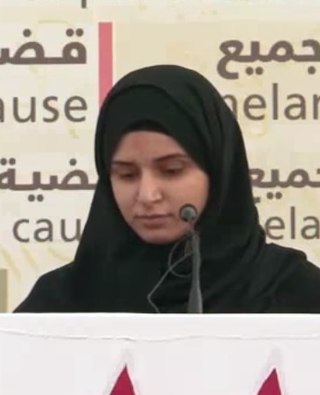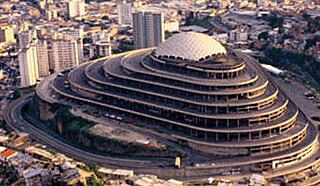
Police brutality is the excessive and unwarranted use of force by law enforcement against an individual or a group. It is an extreme form of police misconduct and is a civil rights violation. Police brutality includes, but is not limited to, asphyxiation, beatings, shootings, improper takedowns, racially-motivated violence and unwarranted use of tasers.
This article describes the use of torture since the adoption of the 1948 Universal Declaration of Human Rights (UDHR), which prohibited it. Torture is prohibited by international law and is illegal in most countries. However, it is still used by many governments.
The Independence Intifada or the Second Sahrawi Intifada and also May Intifada is a Sahrawi activist term for a series of disturbances, demonstrations and riots that broke out in May 2005 in the Moroccan-controlled parts of Western Sahara and south of Morocco. This event has also been called The El-Aaiun Intifada by the same sources.
Torture in Bahrain refers to the violation of Bahrain's obligations as a state party to the United Nations Convention against Torture and Other Cruel, Inhuman or Degrading Treatment or Punishment and other international treaties and disregard for the prohibition of torture enshrined in Bahraini law.

Ahmad Batebi is an Iranian activist who was designated a prisoner of conscience by Amnesty International. During his studies at the University of Tehran he gained international fame for his appearance on the July 17, 1999, cover of The Economist magazine, holding up a shirt splattered with the blood of a fellow protester.

There were widespread reports of systematic and escalating violations of human rights in Zimbabwe under the regime of Robert Mugabe and his party, ZANU-PF, between 1980 and 2017.
Freedom of assembly in Russia is granted by Article 31 of the Constitution adopted in 1993, where it states that citizens of the Russian Federation shall have the right to gather peacefully, without weapons, and to hold meetings, rallies, demonstrations, marches and pickets. In practice, the right to freedom of assembly is restricted by Russian authorities. According to a Russian law introduced in 2014, a fine or detention of up to 15 days may be given for holding a demonstration without the permission of authorities and prison sentences of up to five years may be given for three breaches. Single-person pickets have resulted in fines and a three-year prison sentence.

The government of Belarus is criticized for its human rights violations and persecution of non-governmental organisations, independent journalists, national minorities, and opposition politicians. In a testimony to the United States Senate Committee on Foreign Relations, former United States Secretary of State Condoleezza Rice labeled Belarus as one of the world's six "outposts of tyranny". In response, the Belarusian government called the assessment "quite far from reality". During 2020 Belarusian presidential election and protests, the number of political prisoners recognized by Viasna Human Rights Centre rose dramatically to 1062 as of 16 February 2022. Several people died after the use of unlawful and abusive force by law enforcement officials during 2020 protests. According to Amnesty International, the authorities did not investigate violations during protests, but instead harassed those who challenged their version of events. In July 2021, the authorities launched a campaign against the remaining non-governmental organizations, liquidating at least 270 of them by October, including all previously registered human rights organizations in the country.

Protests against the April 2009 Moldovan parliamentary election results began on 6 April 2009 in major cities of Moldova before the final official results were announced. The demonstrators claimed that the elections, which saw the governing Party of Communists of the Republic of Moldova (PCRM) win a majority of seats, were fraudulent, and alternatively demanded a recount, a new election, or resignation of the government. Similar demonstrations took place in other major Moldovan cities, including the country's second largest, Bălți, where over 7,000 people protested.

The 2011Bahraini uprising was a series of anti-government protests in Bahrain led by the Shia-dominant and some Sunni minority Bahraini opposition from 2011 until 2014. The protests were inspired by the unrest of the 2011 Arab Spring and protests in Tunisia and Egypt and escalated to daily clashes after the Bahraini government repressed the revolt with the support of the Gulf Cooperation Council and Peninsula Shield Force. The Bahraini protests were a series of demonstrations, amounting to a sustained campaign of non-violent civil disobedience and some violent resistance in the Persian Gulf country of Bahrain. As part of the revolutionary wave of protests in the Middle East and North Africa following the self-immolation of Mohamed Bouazizi in Tunisia, the Bahraini protests were initially aimed at achieving greater political freedom and equality for the 70% Shia population.

Azimzhan Askarov was a Kyrgyzstani political activist who founded the group Vozduh in 2002 to investigate police brutality. Of ethnic Uzbek descent, during the 2010 South Kyrgyzstan ethnic clashes, which primarily targeted people of the Uzbek nationality, Askarov worked to document the violence.

Ayat Hassan Mohammed Al-Qurmezi is a poet and student at the University of Bahrain Teaching Institute in Bahrain.
Torture during the 2011 Bahraini uprising was described in many human rights reports as being widespread and systematic; 64% of detainees reported being tortured. At least five individuals died as a result. During the uprising, detainees were interrogated by three government agencies, the Ministry of Interior (MoI), the National Security Agency (NSA) and the Bahrain Defence Force.
The Bolotnaya Square case is a criminal case by the Investigative Committee of the Russian Federation on account of alleged mass riots and alleged violence against the police during the "March of the Millions" on May 6, 2012 on the Bolotnaya Square in Moscow. The demonstration was one of the biggest protests in Russia since the 1990s. By the number of accused, 37 persons, it is currently the largest criminal case against participants of public demonstrations in modern Russia.

The raid on the "Armando Diaz" School took place during the 27th G8 meeting in Genoa in 2001 in the district of Albaro, Genoa. The school building was the temporary headquarters of the Genoa Social Forum, led by Vittorio Agnoletto. A nearby building, housing the anti-globalization organization Indymedia and lawyers affiliated with the Genoa Social Forum, was also raided. On July 21, 2001, shortly before midnight, mobile divisions of the Polizia di Stato of Genoa, Rome and Milan attacked the buildings, with the operational support of some battalions of the Carabinieri.

Torture in Venezuela has been a consistent phenomenon throughout its history. Various dictatorships from the Spanish colonial era into the twentieth century utilized torture against common criminals and political opponents. In the twentieth century, torture was common during the dictatorships of Juan Vicente Gómez and Marcos Pérez Jiménez. Torture also took place occasionally during Venezuela's democratic period, particularly during social outbursts, such as during the Caracazo and the 1992 coup attempts.

The 2019 Gaza economic protests, also called the We Want to Live protests and the 14th March movement, were a series of protests held in the Gaza Strip in response to high costs of living and tax hikes. Moumen Al-Natour is the main organizer of We Want to Live movement, Al-Natour is a Palestinian lawyer and human rights defender.
The 2021 Greek protests broke out in response to a proposed government bill that would allow police presence on university campuses for the first time in decades, for which opposition groups accused the government of taking advantage of the COVID-19 lockdown to impose increasingly authoritarian measures. Protests intensified in response to the hunger strike of the prisoner Dimitris Koufontinas, a former member of terrorist organization 17N, who had started the strike in December, demanding his transfer to a different prison after he had been forcibly relocated to a maximum-security facility in central Greece, as well as issues relating to police brutality and specifically the DELTA Force motorcycle police.
The Athens Polytechnic March 1980 was a demonstration held for the 7th anniversary of the Athens Polytechnic Uprising. During the demonstration serious clashes between the protestors and the riot police occurred, during which the "Units for the Reinstatement of Order (MAT)" killed two demonstrators and injured 150.
Notable cases of police brutality have occurred in various countries.










